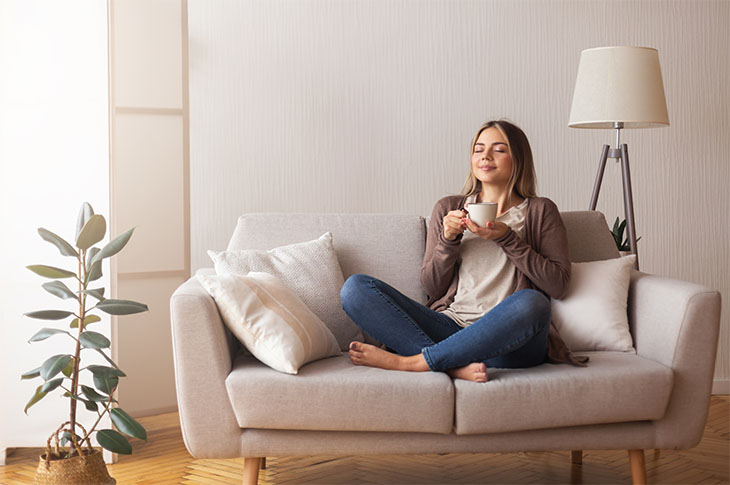
Take a look around. How much is your home a haven for creating and maintaining healthier habits, and how might it be working against you? What about your workplace or community? The spaces we spend the most time in directly impact how we feel and act, but because we’re in these environments every day, we may not notice just how much they influence our habits and routines. Some problems with our environment, such as climate change and pollution, require effort beyond just us. But we can better manage other areas, such as our own surroundings, once we’re aware of their impact on our health and well-being.
Pillars of Health: Harnessing Strength From Your Environment
Stress affects everyone, especially amid a pandemic, and with changes in routine such as working from home or home schooling children, piled on top of any personal stressors. Take a moment to observe your surroundings. In what ways does your home nurture you or add to your stress? A clean, comfortable home with minimal clutter is less stressful than a cluttered one. Clutter can be mentally and emotionally draining, but different people have different tolerance levels for disorganized spaces. How does your space at home or at work affect you? Is it cluttered, dimly lit, noisy?
Once you tune in to what’s getting on your nerves about the spaces you inhabit, it’s possible to take steps to change it.
Your environment can easily impact your sleep. A 2010 study in the Journal of Personality and Social Psychology found that individuals who identify themselves as having a cluttered home demonstrated increased levels of cortisol. Cortisol plays a critical role in regulating the sleep cycle. When cortisol is too frequently elevated it can cause sleep problems. And who needs more problems sleeping?
Noise, either outside or inside, and too much light also can disrupt sleep, as can blue light from devices and interruptions from others either in person or via technology. Experts suggest sleeping in total darkness and silence, and setting your thermostat to between 60º and 70º Fahrenheit.
You also may need to set some boundaries with others and yourself to minimize distractions and create winding-down routines. Consider what might help you set yourself up for a good night’s sleep. Sometimes small changes make a big difference.
Let’s look at activity. When it comes to exercise, people who live in big cities might be affected by noise, lower air quality, and a lack of space. Other areas might lack sidewalks and parks. How does your environment affect your ability to be active? If you’re able to spend time outside, in nature, it can benefit both your activity levels and your stress resilience. Search for a nearby forest, trail or park here.
Once you’ve chosen your activity, what do you need to have nearby to get it done? If you live in a larger city, with traffic and crowds, you may need to exercise when fewer people and less traffic are around. Having a designated area or bag to keep your exercise clothes and shoes easily accessible also may help.
Consider your nutrition. Your physical environment also can influence your nutrition habits and routines. “Limited access to supermarkets or other sources of healthy and affordable food may impede the ability of some Americans to eat a healthy diet,” according to the U.S. Department of Agriculture. For others, the obstacles may be in their own pantry. Do you stock enough staples that you can put together a healthy meal or snack when you’re hungry? Perhaps doing more meal planning and food preparation on less-stressful days can help get you through busier days.
Additionally, there are a number of convenient delivery services that can bring your grocery staples and favorites right to your door. What’s in your home, office, or neighborhood that helps you eat more nutritious, satisfying foods, and what might need to be avoided? A Fitbit health coach can help you work through any challenges.
No matter how many trouble-spots you identify in your environment, start small by focusing on just one or two to change. Making just a few small changes can add up over time, and changes in any one of these areas will start to influence other areas of your health and well-being. Look around. Where can you start today?
Coach Bio: Amy Hoogervorst, National Board Certified Health and Wellness Coach, is a Fitbit health coach. She takes a whole-person approach to well-being and is passionate about helping you become your own best health advocate. When not coaching, Amy also enjoys hiking with her family, running in different U.S. states, and chronicling life through photos.
This information is for educational purposes only and is not intended as a substitute for medical diagnosis or treatment. You should not use this information to diagnose or treat a health problem or condition. Always check with your doctor before changing your diet, altering your sleep habits, taking supplements, or starting a new fitness routine.

If you have questions about a Fitbit tracker, product availability, or the status of your order, contact our Support Team or search the Fitbit Community for answers.
Please note: Comments are moderated and may not appear immediately after submission.